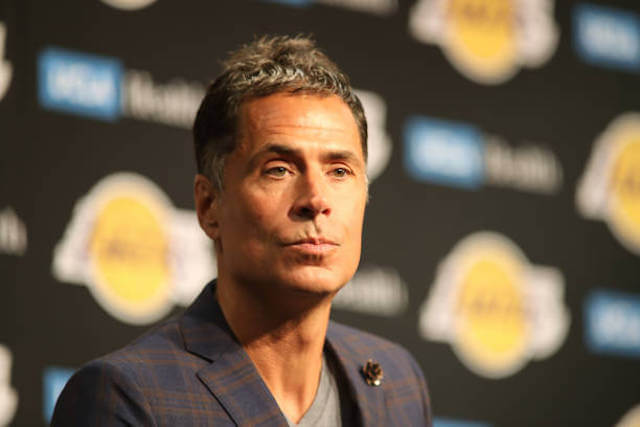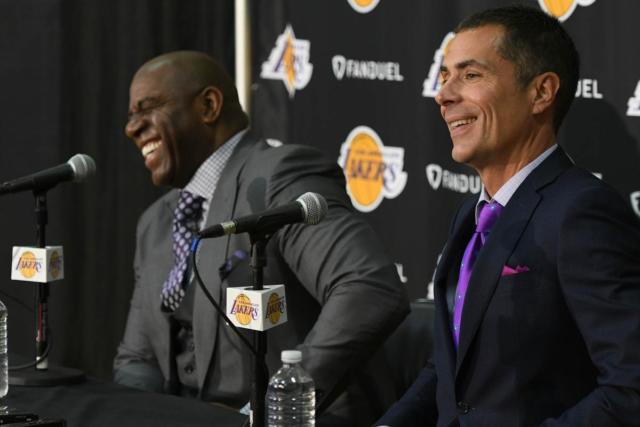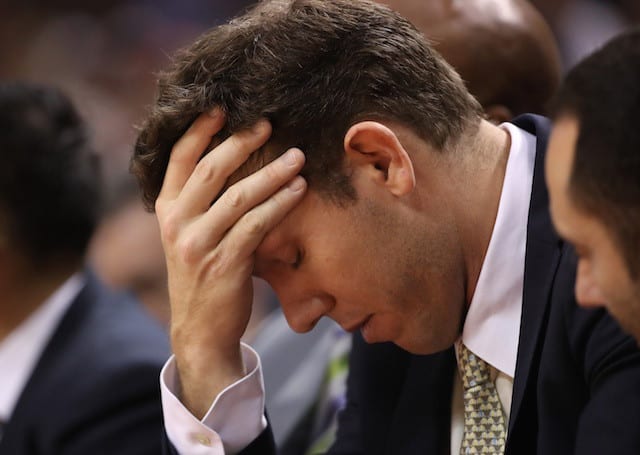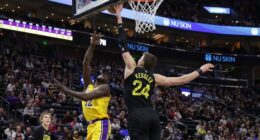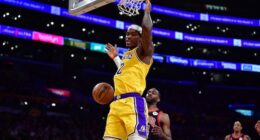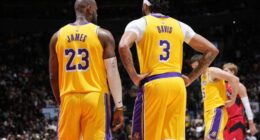Looking at the Los Angeles Lakers-less 2022 NBA Playoffs, it’s difficult to ignore how youth has become the key ingredient of success in this league.
Ahead of the games on April 24, none of the postseason’s top-5 scoring players — Donovan Mitchell, Luka Doncic, Jalen Brunson, Brandon Ingram and Jayson Tatum — were older than 25 years old.
Rookies Herb Jones, Jose Alvarado and Trey Murphy III continued to play a crucial role in the New Orleans Pelicans’ fairytale, making the series with the mighty Phoenix Suns closer than anyone could expect.
And the 22-year-old Jordan Poole temporarily sat Steph Curry (!) on the bench to lead the Golden State Warriors to a 3-0 lead over the Denver Nuggets, averaging 28.7 points on 66.7% from the field and 59.1% from downtown.
Warriors owner Joe Lacob recently highlighted the importance of long-term planning in the roster-building process. And while doing so, he criticized teams — ekhm, the Lakers — who did the opposite last summer.
“There are a couple teams, I’m not going to say who, there’s some other teams that went all-in on older players,” Lacob told The Athletic. “And older players do get injured. That’s the thing you have to remember.
“Suppose we had made a trade, traded away all our youth, for I don’t know, you name the guy, and they’re injured, out for the year. Anytime you’re over 30, 32, 35, these people get injured. It’s data.”
A couple of thoughts on the above statement. If Lacob wanted to make a veiled dig at the Lakers, he failed miserably. L.A. entered the 2021-22 campaign with the oldest roster in the league — whose average age was just below 31 years old, nearly two more than the Miami Heat in second.
It doesn’t take a modern-day Touring machine to crack the code here: He obviously thought of the Lakers when uttering those words. But who’s the second team? The Heat? The Milwaukee Bucks?
Whoever that might be, Lacob is spot on when it comes to his assessment of the Lakers’ failures. Among the many shortcomings the Purple and Gold showed as a team in 2021-22, they couldn’t keep up with the intensity of their opponents.
Initially, their struggles manifested themselves in the form of the ill-famous third-quarter woes. When they took care of their performance post-halftime, L.A. started falling far behind early in games, leading to countless short-lived comebacks.
The Lakers clearly didn’t have enough gas in the tank to compete for the full 48 minutes — and it’s hard to blame them, considering the mileage on their leaders’ odometers.
That also explains why the Purple and Gold seemed way more dangerous when Frank Vogel entrusted his younger players with bigger roles.
Austin Reaves played in each of the Lakers’ wins by 10 or more points but was absent in over a third of the games L.A. lost by the same margin. Reaves clocked in 25.1 minutes per game in close victories — by five points or less — but averaged 22.2 minutes in close defeats.
The rookie’s numbers mirrored those of Stanley Johnson. Johnson registered 26.7 minutes per game in close wins and 23.1 in close losses.
However, the Lakers overwhelmingly prioritized experience over youth last summer, in yet another befuddling deviation from the 2019-20 blueprint that brought the organization its 17th NBA Championship.
In the Orlando bubble, Vogel and vice president of basketball operations Rob Pelinka couldn’t stop praising Kyle Kuzma, Alex Caruso and Kentavious Caldwell-Pope — and rightly so — for their contributions as the team’s key role players.
Caldwell-Pope was the oldest of the bunch at 26 years old.
Not only did the front office sacrifice all three to bring in the soon-to-be-33-years-old Russell Westbrook and accommodate his gigantic salary, but they also added the 22nd overall pick in the 2021 NBA Draft to sweeten the deal.
And they did so only a year after sending the 28th overall pick in the 2020 draft to secure one year of Dennis Schroder’s services.
All of those moves backfired — and backfired badly.
Imagine the 2021-22 Lakers’ supporting cast that includes Kuzma, Caruso, and Caldwell-Pope in addition to Jaden McDaniels, Desmond Bane, or Xavier Tillman from the 2020 rookie class and Herb Jones, Ayo Dosunmu, or Kessler Edwards, who debuted in 2021.
I’d bet any money on L.A. getting more than the 33 wins they racked up with the group they had last season. Meanwhile, all of those young players got to experience playoff basketball in 2021-22 with their respective teams — unlike the Lakers.
It was fun to imagine what the Purple and Gold with Carmelo Anthony on the roster would look like. Or, to talk yourself into believing that the Westbrook experiment could lead to success after all.
Especially after James hit “sent” on that now-deleted tweet in response to the skepticism toward the Lakers’ roster construction, which would only fuel “The Crypt” jokes following the change of Staples Center’s name in December.
But the “f*** them picks” — and, by extension, “f*** them kids” — strategy has turned out to be nothing but a gigantic disappointment since the 2020 NBA championship.
Ironically, the Lakers’ refusal to include their 2027 first-rounder in a potential Westbrook trade package back in February might have been the best decision this front office has made in two years.
Pelinka and Co. should keep that mindset when considering offers for Westbrook this summer and building the 2022-23 roster in general — especially considering how rich in talent the draft has recently been.
People used to say that surrounding James with shooters should be enough to have a go at the title. The 2021-22 season showed that at 37, the four-time NBA champion needs more than that for his team to succeed.
There’s no fooling Father Time. James needs youthful energy and hustle around him if the Lakers want to compete for the highest honors again.
Have you subscribed to our YouTube channel? It’s the best way to watch player interviews, exclusive coverage from events, participate in live shows, and more!
